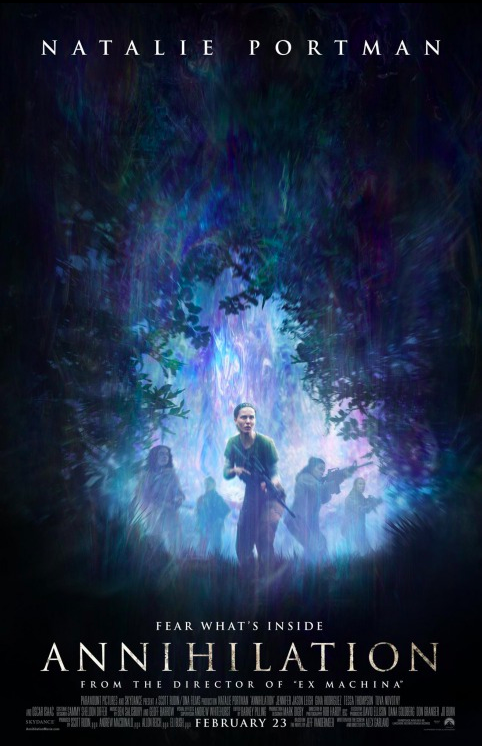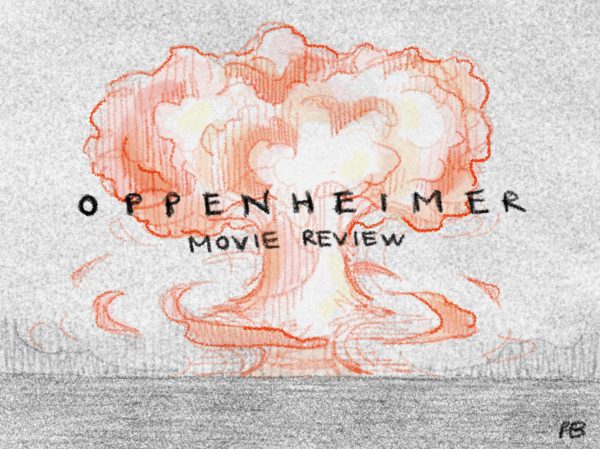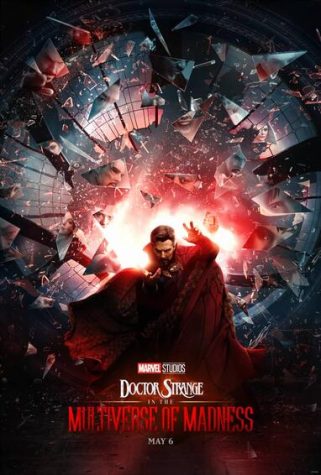Annihilation Movie: A Science Fiction Masterpiece
At its best, science fiction is the most philosophically rich and visually stunning genre in all of film. Think Kubrick’s 2001: A Space Odyssey, Tarkovsky’s Stalker or Solaris, and Villeneuve’s Arrival or Blade Runner 2049. The genre brings a grandiosity that overtakes the scale of other genres. It is almost a form of philosophical experimentation: put humanity in a certain situation and see how it reacts to certain conditions and unforeseen events. This practice then challenges our ideas on the vagaries of life such as human nature and existence itself. The best science fiction never leaves one’s mind, acting as a catalyst in the formation of one’s own philosophy on morality, life, and so on.
Annihilation director and writer Alex Garland has mastered this concept. In his directorial debut, Garland showed his ability to create an intense and intellectually stimulating piece of science fiction with 2013’s Ex Machina, undoubtedly one of the best science fiction films of the past decade. This film sifted through the complicated topic of artificial intelligence and how it will truly attain human-like qualities in the future. Despite the small budget, he was able to create a sleek and concentrated film that thoroughly respected the audience’s intelligence.
It is this latter fact that Garland has made his calling card. His films deal with quite heady concepts, yet at no point feel the need to lecture the audience to make sure they are following along. Instead, his films (and the best of film in general) frequently allow for moments of reflection in order for the audience to theorize, understand, and ponder upon the information/philosophical musings of the characters.
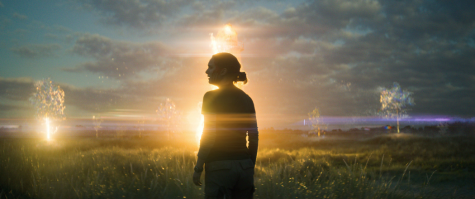
All of this is true for Annihilation as well. From my perspective, although it may be early to say, Annihilation is a masterpiece – a true marvel of the science fiction genre. In an age where originality is extremely difficult to achieve and is often preemptively overlooked, the sheer boldness of this film skyrockets its quality to dizzying heights. In every aspect of film-making, Annihilation is one to be remembered.
Annihilation revolves around army-veteran turned academic-biologist Lena (Natalie Portman), who is stunned when her husband, Kane (Oscar Isaac), returns from a mysterious mission – though he isn’t quite the same man who left one year prior. Soon after his return, Kane becomes gravely ill, and he and Lena are taken to Area X by the Southern Reach organization that sent Kane’s army unit on the mission in the first place. Eventually, Dr. Ventress (Jennifer Jason Leigh) reveals the phenomenon known as the shimmer to Lena, and explains that there’s very little they know about it. In fact, all they know is the shimmer started at a lighthouse and has been expanding for the three years they’ve been studying it, but no one they’ve sent into the shimmer has returned – that is, until Kane. In an effort to save her husband, Lena joins the expedition into the shimmer lead by Dr. Ventress, who is determined to reach the lighthouse and discover the source of the shimmer. Aside from those two, the expedition includes Anya Thorensen (Gina Rodriguez), Josie Radek (Tessa Thompson), and Cass Sheppard (Tuva Novotny). However, their expedition takes a strange turn almost immediately and only gets stranger from there as they learn more about the shimmer and what exactly it’s doing to the piece of Earth it touches. As they venture further into the shimmer, members of the team become more and more devoted to finding answers, even as the expedition becomes increasingly dangerous.
In various interviews, director and writer Alex Garland has repeatedly stated that the film, in many ways, is a meditation on the human quality of self-destruction. While it is certainly a difficult concept to face, it cannot be denied that self-destruction seems to be an inherent facet of human nature. This idea is fleshed out most straightforwardly in a scene where Lena asks Dr. Ventress why it is that her husband “volunteered for a suicide mission”. Ventress, a psychologist, responds as such: “I think you’re confusing suicide with self-destruction, and they’re very different. Almost none of us commit suicide, whereas almost all of us self-destruct. Somehow. In some part of our lives. We drink, or take drugs, or destabilize the happy job, or happy marriage… But these aren’t decisions. They’re impulses… Isn’t the self-destruction coded into us? Imprinted into each cell.” It is here that Annihilation tackles various forms of self-destruction, including the idea of cancer (our own bodies tearing us apart from within), or the very process of aging and dying (self-destruction is literally coded into us). However, the foremost form of this self-destruction explored within the film is what Ventress describes. Many people simply find themselves going down a path that ruins their relationships, their happiness, their well-being, or all of the above. But it is equally as important to understand that it is not always a person just making bad decision after bad decision. As Ventress describes it, these actions are more often “impulses” — things that we cannot seem to change about ourselves. It is this very truism that is perhaps the most terrifying aspect of Annihilation.
Not only is the film intellectually and philosophically rich, it is almost technically perfect. Rob Hardy’s cinematography is beautifully spellbinding, with camera work as curious as the five women in the team. The visual effects and practical effects (which there are surprisingly a lot of) are utterly stunning, capturing the alien nature of the Shimmer with fantastically psychedelic and flowing colors. Most of all, however, the score from Ben Salisbury and Geoff Barrow has its way with the audience to levels I have only heard a few times. The score establishes the mood of every scene, with recurring acoustic guitar themes bringing a sense of curiosity and mystery, winding retro-synths reminiscent of Blade Runner 2049, and one particularly enthralling musical cue towards the end of the film that has stuck with me since I first saw it weeks ago. It is a little four-note sort of hum that is incredibly disturbing; it is in the trailer, and if you watch it, you will know it when you hear it. The reason the score is so important here is that for large portions of scenes, even some up to 10 or so minutes, there is no dialogue whatsoever. As a result, the score ends up being totally encompassing, and if you are a movie score nerd like I am, you won’t stop listening to it for months.
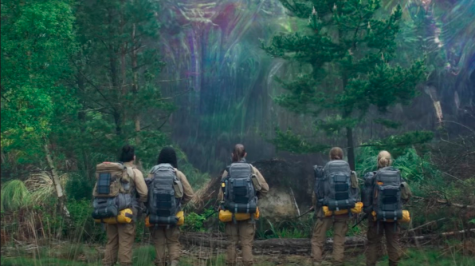
The atmosphere that this score creates varies widely across the emotional spectrum. The film has a unique ability to shift from deep sadness to sheer confusion, to nervous exhilaration and so on without any sort of disconnect between scenes, as Garland and his editors found a way to construct the film in a way that flowed beautifully from scene to scene. The three most prominent emotions or states-of-mind that you will find yourself experiencing within this film are a state of complete terror, a feeling of your mind being completely blown, and a tense combination of the two, ending up in a sort of nervous curiosity and investment. The originality of the film only adds to this, as each emotional experience is enhanced by an additional feeling of never seeing anything like it before.
As far as performances go, Annihilation again was an all-around success. Natalie Portman is amazing, and at times she carries much of load on the performance front. Gina Rodriguez plays a character that you may find yourself hating as she descends into madness, but she does it so masterfully that you cannot help but appreciate it. Despite not having a whole lot screen time, Oscar Isaac runs the gamut on this one, showing his equal ability to portray charisma and all-out confusion/mystery. Tessa Thompson, Jennifer Jason Leigh, and Tuva Novotny also bring strong performances in supporting roles.
There is so much to this film that I have yet to explore within this review. From the theme of self-destruction (of which there is much more to discuss), to the events of the film within spoiler-territory that I did not discuss (as I pray that anyone reading this would please find a way to see this film), you could talk about Annihilation for hours and hours without even scraping the surface of the film. Isn’t the best science fiction this way? We still haven’t stopped discussing and analyzing legendary films like 2001: A Space Odyssey even 50 years after its release. I predict that Annihilation will have a similar fate. My rating for this film is 5/5 stars: an absolute masterwork.

PJ Knapke is a senior at Glenbard West and a Columnist this year for the newspaper. His focus on is on film-related content, particularly reviews. He is...
